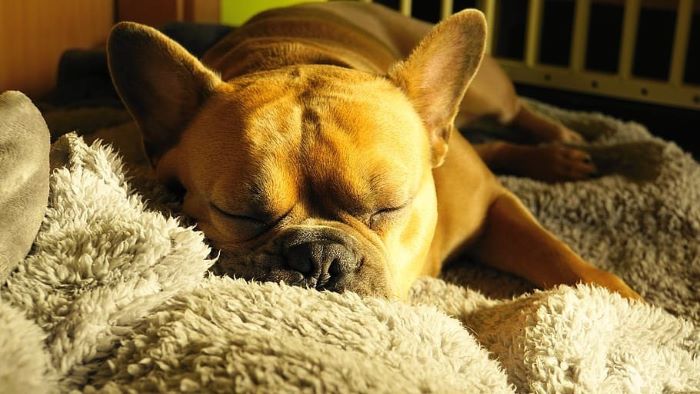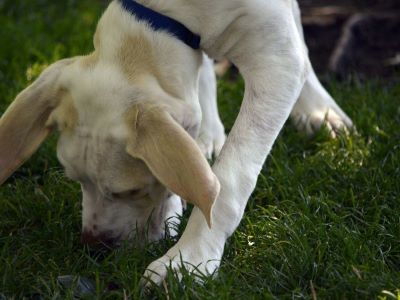You and your sweet pup after a big dinner head to bed. They’re on the floor next to you in their comfy bed. You both doze off until you wake up to snoring. This became regular. You found it endearing at first, but now you’re annoyed and concerned.

There were so many questions running through your mind. Can dogs snore? You’ve only seen it in cartoons. Is it normal for dogs to snore? Why does my dog snore so loud? Well, wake up! It’s time to find out!
Key Takeaways
- It is common for dogs to snore. There are many reasons behind it. Some suggest ailments and some are common reasons.
- Your dog can snore due to improper sleep position. Changing the bed and sleep position can help.
- If you are a smoker, your dog may have inhaled the smoke causing your pet to develop lung disease.
- Some breeds are genetically prone to snoring, like French Bulldog, Pug, Boxer, and Boston Terrier.
- You should take your pup to the vet if they have difficulty breathing while awake.
What is Snoring?
When throat tissues become too relaxed and you huff out the air, it causes a vibrating sensation and a dreadful hoarse sound, that is snoring. Tongue and throat muscles excessively relax causing a narrow airway which results in snoring.
Old people and Overweight people are prone to snoring. Regular movement and changing sleep position can aid with this. Although snoring isn’t exactly healthy in humans, it is common. But what about dogs?
Causes for Snoring
It is common for dogs to snore. There are common reasons for it and there are reasons that indicate illness. For example, when dogs sleep on their backs, gravity draws the throat tissues downward, restricting the airway. And you will hear the pleasant snores. You can solve this by changing their sleeping position.
Another reason could be, that if they recently had an allergic reaction, their lungs are congested. Or it could be the seasonal cold. This can lead to snoring. By treating their allergy or ailment, you can put an end to snoring.
When you were out on a nice walk. Your dog may have sniffed up a grass blade.

With a foreign object lodged up its nose, it’ll struggle with breathing. You may notice your dog trying to sneeze the object out. Use a damp cloth to clean their nasal passage.
When should you be concerned about their snoring?
Concerning Reasons for Snoring
If you are a smoker and smoke around your dog, it can cause your dog to inhale the smoke. Second-hand smoking[1] can cause your pet to develop lung diseases. Smoke irritates and inflames the airways, making it difficult for your dog to breathe correctly. And your doggo will snore when it sleeps.

For the love of your pet, avoid smoking near them. Or much better, quit altogether!
Some breeds are naturally susceptible to snoring. French Bulldog, Pug, Boxer, and more possess shorter heads and noses. These breeds also suffer from Brachycephalic Obstructive Airway Syndrome. This causes the palate that extends to the back of the throat to sag, which can hinder the airway.
“Most dogs with this syndrome breathe more easily through their mouths than their noses. The more abnormalities present, the more severe the signs,” says Malcolm Weir from VCA Animal Hospitals. “Mildly affected dogs will have noisy breathing, especially with exercise, and most will snort when excited and snore when relaxed or asleep.“
A surgical procedure can help fix the anatomical abnormality.
When they are overweight, fat collects around their throat, and they can have difficulty breathing.
When to See a Vet?
If this has been going on for long, a professional can intervene, The vet may conduct various tests to rule out conditions and to arrive at a diagnosis. If they show symptoms like lethargy along with being overweight, it can indicate Hypothyroidism[2]. Synthetic thyroid hormone called levothyroxine can treat it.
Dogs have a habit of sniffing the ground, it helps them navigate the world. If they mistakenly snorted up a fungus that grows on the ground and dead leaves it can lead to Fungal Infection. Your vet may prescribe antibiotics to treat the condition.
Snoring is common but, in case your pet starts wheezing, take them to the local vet immediately. It can indicate an underlying illness. Eyes and nose watering is also concerning.
How You Can Help
Getting a new dog bed with a pillow or some kind of head support can fix your dog’s sleeping position. Make sure they sleep on their side and not on their back.

An air purifier can help kill airborne allergens, and your pooch can smell clean air.
Fungus tends to grow near water bodies. Try avoiding swampy, wet areas to prevent fungal infection.
Help your dog shed a few pounds. Make dietary changes and take them for walks more often. Invest in a food puzzle for your fast-feeding pet to encourage them to slow down.
FAQs
Which dog breeds snore the most?
Dogs with a stout/push-face structure like Pugs, Bulldogs, and Boston Terriers tend to snore more than other breeds.
Do dogs snore more as they age?
As dogs get older, their palate gets softer and saggier. It can result in snoring.
Is a snoring dog a happy dog?
Dogs will snore when they are happy, content, and feel safe.
Can dogs snore while awake?
It can be that their nose is blocked by a foreign object and their breathing sounds similar to snoring.
When my dog breathes it sounds like snoring?
This can be due to Brachycephalic Obstructive Airway Syndrome. We advise to consult a vet.
Conclusion
Dogs snoring can be calming to hear but, not for long. It is also a symptom of serious ailments so we recommend a trip to the vet. Share with the vet whatever changes and patterns you have observed. It will help diagnose the problem.
Follow the doctor’s instructions and you and your buddy will be fine. Sleep well!
References:
- Secondhand (and Third-Hand) smoke may be making your pet sick. U.S. Food And Drug Administration.
- Hypothyroidism. Cornell University College of Veterinary Medicine.



